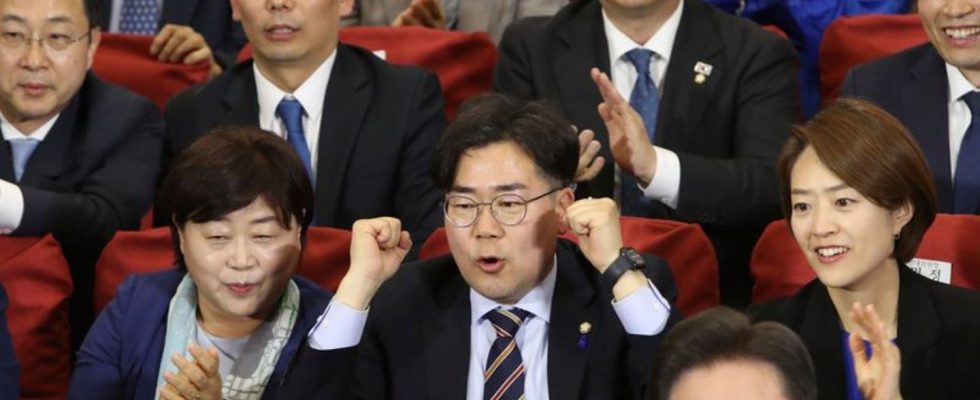East Asia
Forecast: South Korea’s opposition clearly ahead in parliamentary elections
Opposition leader Lee Jae Myung and other members of the Democratic Party (DP) react to the announcement of voter polls after the general election. photo
© Chung Sung-Jun/Pool Getty Images AsiaPac/AP/dpa
The parliamentary election in South Korea is seen as an interim test for the government. According to initial forecasts, the president’s party is failing to achieve its goal of changing the balance of power in its favor.
Opposition leader Lee Jae Myung’s Democratic Party (DP) could even expand its current position as the strongest single party in the 300-seat National Assembly. Together with its smaller sister party, the Democratic Alliance of Korea, the party could expect 178 to 196 seats, South Korean public broadcaster KBS reported.
The ruling People Power Party (PPP) and its allies would only get 87 to 105 seats. The forecast was based on a joint voter survey with the broadcasters MBC and SBS directly after the election. Reliable results are expected at night.
“Results are disappointing”
The defeat would be a bitter blow for Yoon’s party. She had hoped to be able to change the balance of power in parliament in her favor so that she could push through legislative proposals more easily. “The results of the post-election polls are disappointing,” PPP leader Han Dong Hoon said before vote counting began, according to the national news agency Yonhap.
Experts spoke on television of an impending disaster for the government camp. The election was seen as an important interim test for the government under Yoon, who has been in the highest state office for two years. The next presidential election in the democratic country is planned for 2027.
According to the broadcaster’s calculations, two smaller progressive parties could have up to 16 parliamentary seats. This would make it possible for an overarching opposition bloc to achieve a “super-majority” of 200 seats, it was said. That would theoretically allow him to change the constitution. According to the country’s presidential constitution, Yoon can continue to govern with a majority of the opposition in parliament, as before. However, in this case, the government’s important reform projects could be blocked by the opposition.
The election campaign in Asia’s fourth largest economy was marked by mutual attacks from opposing parties. The DP and other parties had called for a verdict to be passed on the government, which they accused, among other things, of economic incompetence in view of rising food prices. The PPP asked voters to vote to support the government’s reform policies and keep the opposition in check. More than 44.25 million citizens were called upon to cast their votes in the election on Wednesday. According to preliminary information from the State Election Commission, turnout was 67 percent. According to the Yonhap Agency, this was the highest number in parliamentary elections in 32 years.

